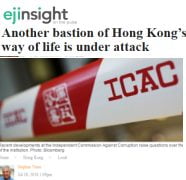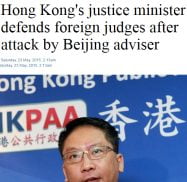Ten years ago, Hong Kong’s then-Secretary for Justice delivered a ‘keynote speech’ to a conference. Attendees probably dozed through the standard cut-and-paste phrases about taken-for-granted rights and freedoms – government officials always recited them on such occasions. Those paying attention would have heard Wong Yan Lung list ‘minimum rights of those suspected or accused in criminal cases’…
protection from unreasonable search and seizure
protection from arbitrary arrest or detention
protection from unfair interrogation
protection from irregular trial.
Speaking at the symposium organized by the Independent Commission Against Corruption, Wong went on to say…
…corruption erodes basic public functions. Places exist where the national wealth … ha[s] been embezzled by the corrupt, and the people in consequence have been left to fend for themselves in often appalling circumstances. People are clearly deprived of basic rights if corrupt acts diminish the quality of that which is provided to them, or if the pool of available resources is improperly diminished, or if one person enjoys an unfair advantage over another.
People snored through such pleasantries in 2006. But today’s Justice Secretary, Rimsky Yuen, or a colleague like Chief Secretary Carrie Lam, would probably shy away from standing up in public and being this specific. In 2016, such pointed comments would awkwardly suggest criticism of the Chinese government’s assaults on the city’s rule of law.
Read that list of suspect’s rights to Lee Bo, snatched (there is no other explanation) from the streets, taken illegally over the border by Chinese security agents and – as with the other book-sellers – deprived of those exact same rights.
Read the description of the evils of corruption to millions of Mainland Chinese victimized by unaccountable power-holders, and to the lawyers and activists persecuted for trying to defend them. Or read it out to Hongkongers wondering what is happening to the ICAC.
The apparent ejection of the ICAC’s top investigator is part of a pattern in which China’s  Communist one-party state is taking control of Hong Kong’s supposedly independent institutions. This includes: the politicization of government functions like the police, prosecution services and (now) electoral governance; the appointment of stooges onto governing bodies of universities, the police complaints authority and the ICAC; and informal intimidation and smearing of government opponents, and increasingly blatant media bias.
Communist one-party state is taking control of Hong Kong’s supposedly independent institutions. This includes: the politicization of government functions like the police, prosecution services and (now) electoral governance; the appointment of stooges onto governing bodies of universities, the police complaints authority and the ICAC; and informal intimidation and smearing of government opponents, and increasingly blatant media bias.
One commentator writes ‘none of this is inevitable, nor is it unstoppable’. However, he gives no evidence.
It probably is inevitable. Before the handover, there was a nagging fear that the Chinese Communist Party would not be able to resist clamping down on Hong Kong’s pluralism. But the biggest worriers emigrated, and the opinion-formers assured everyone left behind that China would become more like free Hong Kong over time, so the need to resolve the contradiction would ease.
Clearly, under its present leadership, the Communist Party is digging in. Survival of the one-party regime is all that matters. In order to retain absolute control, economic reform will slow, stop or be reversed, and the media, the Internet, NGOs, academia, religions, lawyers and any other possible source of opposition must be shackled. The ruling elite are paranoid about enemies and plots, and Hong Kong, with its tradition of ‘impartial’ public institutions, is riddled with hiding places for hostile forces. Turning the city’s police, universities and media into tools of the government is a matter of basic state security. In a Leninist system, you can’t not do it.
The ICAC is clearly no exception. Its independent structure, with deliberate internal separation of powers, allows it to investigate (search, arrest, detain and prosecute) Beijing’s appointed and approved Hong Kong government officials or local personnel of state-owned or -linked enterprises. In other words, it can challenge the Chinese regime’s monopoly of power – which cannot be allowed. Enough muttering about British infiltration of the ICAC: time to act and bring it into line.
Beijing already has the right to overrule our judiciary and courts, thanks to the mechanism allowing it to ‘interpret’ the Basic Law to mean anything it wants. But this veto is  removed and delayed, and in practice Hong Kong courts can, and do, override the Beijing-appointed government. Nothing can stop them from, say, releasing arrested pro-independence agitators on free-speech grounds. A paranoid Communist regime must instinctively see such bodies as a potential source of challenge to state power, and hands-on management of the judicial system (also infiltrated by the British, of course) is logically only a matter of time.
removed and delayed, and in practice Hong Kong courts can, and do, override the Beijing-appointed government. Nothing can stop them from, say, releasing arrested pro-independence agitators on free-speech grounds. A paranoid Communist regime must instinctively see such bodies as a potential source of challenge to state power, and hands-on management of the judicial system (also infiltrated by the British, of course) is logically only a matter of time.
Barring a ‘Zhongnanhai Spring’ of enlightenment and liberalization, the long-awaited clampdown in Hong Kong does indeed seem ‘inevitable’. Whether it is ‘unstoppable’ is another matter. Can Hong Kong be so stubborn, uncooperative and resistant that Beijing decides it’s not worth the trouble?

Wonderfully written. Among your best posts.
Who would have thought we’d find ourselves looking back on the Jiang or Hu eras as a time of relative openness? Who would have thought a relatively unknown “second-generation red” technocrat would turn out to be a totalitarian monster?
And who would have predicted that a class of HK bureaucratic hacks would sell out their own fellow citizens? In hindsight it may all look clear, but as recently as six or eight years ago the situation still seemed hopeful.
The “totalitarian monster” was predicted several years ago. Summed up by whoever it was who pointed out the (then) next generation were those who had evolved in the Cultural Revolution and said “it will not be pretty”.
Xiaoyao, It’s all going to get much worse before there’s any chance of it getting any better. Today will also seem like a golden age, when doors start being kicked down, public thoroughfares are blocked, the judiciary require personal protection, the media are closed and the ICAC can’t recruit.
Hemlock, Thanks — worth the wait! You’re one of the very few institutions still standing.
You try to finish on a positive note. But Peking will never relax control over HK: if they’d wanted to allow survival, the face-saving opportunity was there in the 1980s, when China was much weaker. They will now send the troops in/impose direct rule/ban foreigners/evacuate the population to Xinjiang or the Spratlys before giving an inch.
And it’s even a moot point if HKers are tough enough to fight. Many will emigrate while they can. All have had easier lives in the wider scheme of things: no starvation, no invasion, no revolution, no major natural disaster, no civic chaos, no terrorists, not even a real financial crash. There’s not even much feeling of solidarity with fellow citizens, meaning that individuals and institutions can be worn down increasingly fast.
It now seems obvious that the crumbling of the multiple institutions that supposedly made Hong Kong different was only a matter of time, given the inherent lack of accountability of the government. Exco is opaque, Legco is fixed and anyway toothless, government departments set policy without real oversight, and the CE answers to Beijing. This was all well understood. Yet for so long after 1997, many of us – myself included – continued to believe, firstly, that the Rule Of Law, independent judiciary, Asia’s Finest, the ICAC, an open media and all that could somehow keep us on course despite the government with its hands on the steering wheel needing to look over only one shoulder, and secondly, that Beijing really wanted Hong Kong to look after itself and to leave us to get on with it, and that our failure to develop was our own government’s uncalled for cravenness towards the centre. Your piece today lays out the foolish naiveté of this position, and leaves no doubt that the controls put in place in the Basic Law, but then assumed to be theoretical, were always intended to be activated.
There’s still one major obstacle in the CCP’s path – the demographic one. Their local supporters are late-middle-aged shading into geriatric. It’s a time-limited offer about to expire. Beijing’s local proxies have set themselves up for an ugly war of attrition against the generation that came of age after 1997, otherwise known as the people who think Long Hair is too moderate.
Is there any chance that they will go after the patriotic societies anytime soon ? Whaddaya reckon ? In that case I’ll have to make a few phone calls and do some ‘corporate restructuring’, if you know what I mean.
This dates me. I can remember the USSR behaving in the same way in the 50s, 60s and 70s before imploding from resource misallocation and, as has already been pointed out in relation to the PRC, not enough humping.